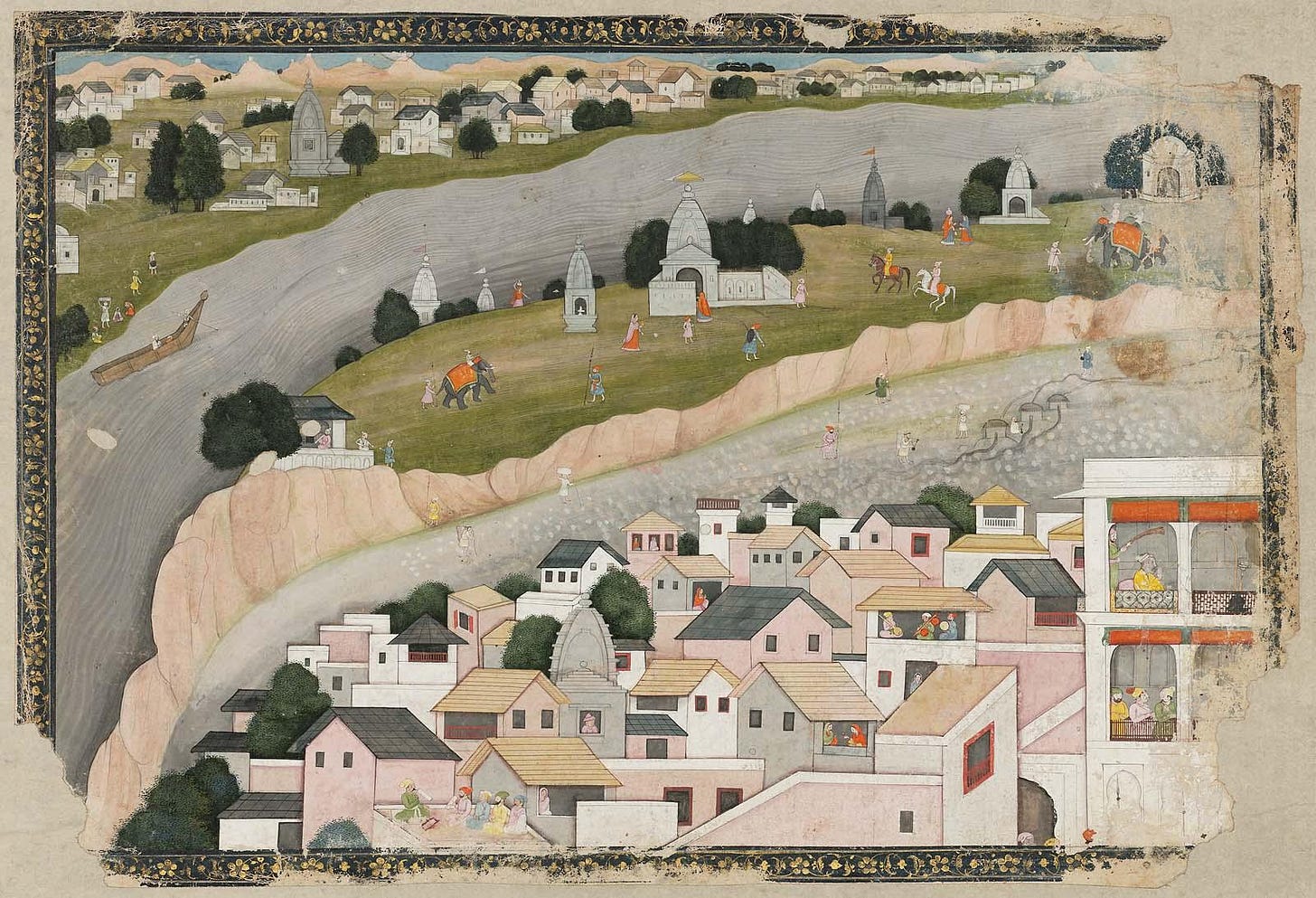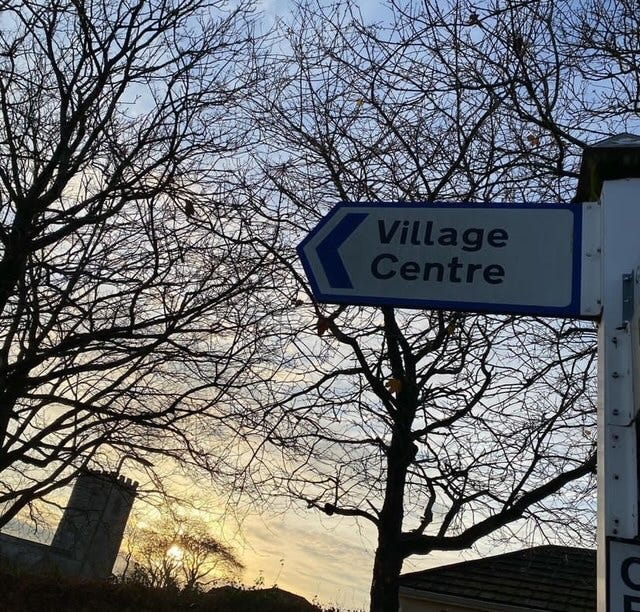The Village #1: Introducing this series
A brief introduction: motherhood, community, and belonging
Welcome, especially to new subscribers. If you’re new here, this post is a good place to start. RedLands is a place where I think about the becoming world and our place in it, and the miracle of being alive. I write out of my experiences of community, motherhood, soil, soul, politics, ecology, writing and more. I’m so glad you’re here.
Gen Z - the generation born between about 1996 and 2012 - is apparently experiencing severe loneliness, heightened by the pandemic and by social media. In the UK, calls to Childline from under 11s struggling with loneliness have risen by 71 per cent in the past five years. The WHO has identified social isolation as a serious concern, and linked to rising rates of depression and anxiety.
For some time, I’ve been thinking about these trends. About what keeps us together and what separates us. About what community has meant, and means now, and could yet mean. About the forces that are shaping us individually and collectively.
I’ve walked alongside communities in local UK politics and in international development. In my own life I’ve been part of various communities at various times. Some of the questions these contexts have prompted include:
What is community? Is it rooted in history, or shared goals? Is it about being likeminded or like-located? (I touched on this in a previous post).
What does community mean here, in this particular place with these particular people?
How do we build community, and maintain it?
Can we name and resist the forces that are working - intentionally or otherwise - to fragment community?
How can individual and community both thrive together, each valuing the fullness of the other?
Motherhood has resurfaced these questions for me in a new way. I want to know where the the literal and figurative village is that will raise my daughter, and perhaps raise each other and our shared future too. I do not want my daughter to ever have to call Childline because of loneliness. I want her to know that she is held by people and place, and that she belongs. I want to know how to belong too.
Below is a piece I wrote for a recent issue of Resurgence Magazine (the print version had some beautiful artwork alongside it). The issue was called ‘Threshold Places’; motherhood has felt like a threshold between independence and interdependence. I’ll be continuing to explore themes of community and ‘the village’ in future issues of RedLands, and I’d love to hear your thoughts and experiences along the way.
What does community mean to you? Do you have a ‘village’? - how do you enter into its rhythms, giving to and receiving from it, whilst also honouring your own uniqueness? I’d love to know.
With love,
Elizabeth
PS - if you value RedLands, please share, and click the little heart button at the bottom - it helps other readers to find it. Thank you!
Some other RedLands posts on a similar theme:
About ‘arriving where I stand’, here
About interdependence, here
(And unrelated, but for writers, my emerging ‘Write Life’ series, see here)
The Edge of Motherhood (from issue 344 Resurgence, in print and online here)
I am standing in the doorway of my house deciding whether to turn left or right on the lane outside. The decision is not really about direction, though – it is about who I was, and who I am being invited to become. Turning left – as I always did before I gave birth to my daughter – takes me up the lane, out of the village, towards views and expanse. Living in mid Devon, with its green lose-yourself valleys and little hills and heavy rain, expanse can feel hard to come by and I crave the space, the lightness, the wind that outlines my solitary edges. Turning right takes me down the hill, past cottages and the pub, past the village hall, which bears traces of what community has meant to this place. I step outside, close the door, and turn right. I turn to the village because I am trying to find the literal and figurative one that it will supposedly take to raise my daughter.
My husband and I moved to this village because of affordability, not roots. We are investing in community, but I have felt lonely in this time of ‘matrescence’ – the process of becoming a mother. I speak to other mothers who feel the same.
Until the industrial age, children were raised in community, with siblings, cousins, grandparents, aunts and neighbours often caring for newborns and new mothers. In her book Mothers and Others: The Evolutionary Origins of Mutual Understanding, anthropologist Sarah Blaffer Hrdy makes the case that since the Pleistocene it really has taken a village to raise a child. Our ancestors of the taxonomic subfamily Homininae developed an ability and need to care and cooperate in a way that others didn’t. We are here today because we cared about each other.
But the nature of caregiving, of community, has changed. We generally no longer live amongst family and friends, more emphasis is placed on individualism, and ‘third spaces’ conducive to communal life such as libraries and parks are closing down. It can be easier to pay for help than to ask for it.
Before giving birth, I read books that gave advice based on the mother-baby dyad, never the village. I go to baby groups and am grateful for the connection, but all of us there are exhausted. My husband loves spending time with our daughter, but he does the lion’s share of paid work, so it’s me and her most days. I am trying to work and write around the edges, to remember my shape, but we need help. I need help, and so I am seeking my own village.
I am confronted by this need for a village, because although I have worked with communities and represented them internationally through charities and locally through politics, I’m not sure I’ve ever been deeply immersed in one. I have declined so many invitations to belong – by moving, by neglect, by fear.
Community is necessarily challenging, but it is also a gift. Motherhood asks me to receive that gift, to step into the village – this literal one, and the wider figurative one – rather than watch from the edge. It asks me to cross from independence to interdependence, to a new way of being. I want my daughter to know who her neighbour is, and how to love and be loved by them even when they are nothing like her. I want to know this for myself, too.
There are clues here about love: neighbours help with jobs without us even asking; church members brought us meals after I gave birth; there’s a youth club run by tired volunteers who make sure children have somewhere to belong on a Friday night. Love is everywhere and generous: hedgerows brim with blackberries, blackberries bubble into jams, jams sell to raise money for the food bank, the food bank (alarmingly) feeds the farmer who tends the hedgerow; life forever giving-receiving-giving-receiving. It’s a love that appears unremarkable, mud-stained, mundane. It is patient, particular, place-based, and asks me to be the same; to arrive at the ground and relationships beneath my feet and choose to stay.
The love needed for village-building is here. What’s missing is the social and practical infrastructure to support it, the recognition that children and mothers and all of us wither if the village does. Spaces to build communal life are dwindling, policies and funding that support care and community are pared back while the cost of living goes up.
I have friends scattered geographically and online; these relationships are an important part of my wider supportive ‘village’, but still reclamation of place-based community feels essential. I’ve seen its power particularly in my work across Africa; it is, as author-farmer Wendell Berry says, “a commonwealth: a place, a resource, and an economy. It answers the needs, practical as well as social and spiritual, of its members.”
The village pushes back against messaging that praises western individualism and tells us we can do it all alone – after two decades of work with communities, it has taken motherhood to make me realise I can’t, and it is taking the fragmentation of communities to make me realise what we’re collectively losing. Now I want to understand and reclaim the ecologies of care we were all once rooted in.
We stand outside, my daughter and me. A breeze blows through the village, through other lives, and now embraces the shape of us too. I see dark clouds approaching over Dartmoor, and I am struck by the frontier between clear sky and approaching storm, between light and dark, between what has been and what is becoming. We go back inside to the intimacy of a crib, and I think how this love, this motherhood, can seem mundane. But the word ‘mundane’, I have learned, is rooted in the Latin mundanus – ‘belonging to the world’ – and this is what motherhood invites me to transition into, what it asks that we reclaim: communality, interdependence, belonging somewhere in this brutal, beautiful world.






Disturbance, dislocation and disembodiment. Almost as though we are in a process of being broken up for scrap by ever present leapfrogging linear technological improvement.
How do villages of actual people resist as our cities and towns crowd in on themselves building themselves into total artificiality.
As a farmer I am lucky to be amongst a village community via the Sheep and Cattle whose heads appear above the hedges of neighbour's fields and gardens. (James Ravilious - "Down the deep lanes" etc).
In watching over the animals I have a third party allowance to chat at random. The chance for weightless interaction and the sharing of the joy of being in the countryside but also the chance to help others when a need arises.
Morning Elizabeth, I'm delighted to have discovered your 'blog' Redlands, and would like to send you some of my thoughts about community ( which I also recently , albeit briefly, shared with Gill Westcott). Please do let me know the email address to use, warmest, Paula Kovacs (Crofts resident, Sandford)